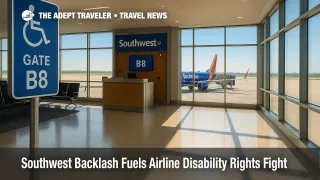Southwest backlash fuels airline disability rights fight

Two blind travelers say Southwest Airlines forgot about them during a five-hour delay in New Orleans, then flew them to Orlando as the only passengers onboard. The July 14 incident renews scrutiny of how airlines communicate and provide assistance to travelers with disabilities, and whether they meet obligations under federal law. Southwest apologized and issued $100 vouchers, while denying it failed to assist. The dispute lands as the U.S. Department of Transportation tightens enforcement and clarifies airline disability rights nationwide.
Key Points
- Why it matters: Frontline failures can strand disabled travelers despite clear federal rules.
- Travel impact: Confusing rebookings and weak follow-through risk missed flights and unsafe situations.
- What's next: DOT rules and fines are rising, and airlines face closer oversight.
- Southwest context: The carrier cites available curb-to-gate escort help, but passengers say execution lags.
- Industry-wide: DOT fined American $50 million for wheelchair mishandling, signaling wider problems.
Snapshot
Sherri Brun and Camille Tate were booked from Louis Armstrong New Orleans International Airport (MSY) to Orlando International Airport (MCO). After hours of delay, most passengers moved to another Orlando-bound flight at a nearby gate. The women, both blind, say no one guided them to the new gate, and they eventually flew alone on the original flight. Southwest apologized and offered each a $100 voucher, asserting the pair completed travel and that assistance is available when customers self-identify. The travelers argue communication and follow-through were inadequate, a common refrain among disabled flyers.
Background
U.S. carriers must provide prompt, effective assistance to passengers with disabilities under the Air Carrier Access Act and its implementing regulation, 14 CFR Part 382. Requirements include help moving between gates, timely deplaning, and accessible information during irregular operations like gate changes. DOT also published the Airline Passengers with Disabilities Bill of Rights to explain those protections in plain language. Despite the rules, DOT data and enforcement actions show persistent gaps, especially around mobility devices and gate-to-gate assistance.
Latest Developments
Blind passengers left at gate as delay snowballs
FOX 35 Orlando reports the New Orleans to Orlando flight ran nearly five hours late. Most customers were accommodated on an earlier departure from a nearby gate, but Brun and Tate were not rebooked and say no one escorted them to the alternate flight. Southwest apologized, offered $100 vouchers, and pointed to its disability assistance policies that require self-identification while also assigning employees responsibility for gate-change assistance.
What the law requires under the ACAA
Federal rules obligate airlines to provide, or ensure, assistance within the terminal, including between gates for connections, in a prompt manner. That includes personnel and mobility equipment as needed. The eCFR text of 14 CFR Part 382, Subpart G, details this duty and clarifies timeliness standards for boarding, deplaning, and connecting assistance. For an overview of your rights, see DOT's Bill of Rights.
DOT enforcement and wheelchair protections expand
DOT finalized new protections effective January 16, 2025, strengthening rules for travelers who use wheelchairs, including training requirements and faster return or delivery of delayed mobility devices. Separately, the government fined American Airlines $50 million for years of wheelchair mishandling, and noted problems are not confined to one carrier. DOT has also proposed making damage or delayed return of a wheelchair an automatic ACAA violation. See DOT's summary of the proposed rule.
Analysis
I am legally blind. I have been stranded at gates and "forgotten" during irregular operations more than once, even after notifying agents that I needed guidance. Situations like the one alleged in New Orleans are not outliers, they are the foreseeable result of treating accessibility as a checkbox instead of a core operating standard. Policies promise curb-to-gate escort for blind travelers, but the breakdown happens in execution, especially when gate changes or rebookings cascade across a station.
Southwest is far from alone. DOT's own data shows persistent mishandling of wheelchairs, and in October 2024 Southwest reported 309 mishandled wheelchairs and scooters out of 24,097 enplaned, a rate of 1.28 per 100. American's $50 million penalty underscores widespread failures and a new enforcement posture. When carriers miss basic handoffs during delays or fail to locate and escort visually impaired travelers to a new gate, they are not just disappointing customers, they are likely violating federal rules.
It is because of this difficulty that I founded The Adept Traveler, to help everybody, and especially people with disabilities, travel better. Airlines must backstop their promises with staffing, training, and accountability across stations, not just policy pages. And when they fall short, travelers should file complaints with DOT so patterns are documented and enforcement follows.
Final Thoughts
Airlines cannot outsource accessibility to chance encounters with a helpful agent. They need procedures that survive delays, gate changes, and rebookings, with proactive verbal announcements and physical escort when requested, especially for blind travelers. If you encounter barriers, file a DOT complaint and ask to speak with the airline's Complaint Resolution Official on the spot. Strong rules help, but consistent execution is what restores dignity and safety in air travel for all, and it is the only way to honor airline disability rights.
Sources
- 2 blind Florida women felt left behind by Southwest: 'They forgot about you', FOX 35 Orlando
- 14 CFR Part 382, eCFR
- Airline Passengers with Disabilities Bill of Rights, U.S. DOT
- December 2024 Air Travel Consumer Report, U.S. DOT PDF
- US fines American Airlines $50 million over mishandling of disabled passengers and wheelchairs, AP News
- Ensuring Safe Accommodations for Air Travelers with Disabilities Using Wheelchairs, U.S. DOT Final Rule PDF
- Disability-Related Assistance, Southwest Airlines Help Center
